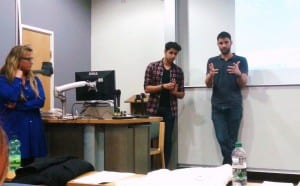SSEES Library Green Group meets Global Citizenship Programme
By Agnese Riva, on 14 June 2016
On Thursday 2 June, the SSEES Library Green Group (aka Green Comrades) organised a screening of “Swamp Dialogues”, a documentary focusing on the people who live in the protected area of Romania’s Danube Delta, Europe’s second largest river delta (view trailer here). It is part of our Green Impact excellence project and was arranged in the context of UCL’s annual Green Impact competition, in collaboration with the UCL Global Citizenship programme, which offers a strand dedicated to the Danube. 
The screening was introduced by Eszter Tarsoly, Senior Teaching Fellow in Hungarian Language at SSEES and Course Leader on the UCL Global Citizenship Programme. It was followed by a discussion about the relationship between people living in protected areas and their environment, led by Sahil Nijhawan and Rafael Chiaravalloti, both PhD students at the UCL Department of Anthropology. The event was attended by about 60-70 people, and was rounded off by a Danubian food and drinks reception. It was well received as the positive feedback from students indicates.
“Genuine, funny and eye-opening, this film raised many questions about the Danube and those who have lived and worked there for generations.” (Rebecca Huseyin – for more feedback click here)
This academic year SSEES Library’s Green Group decided to participate in the Green Impact 2015-2016 competition with an Excellence Project for the first time. The team felt that a project is not only more engaging and inspiring to work on but also allows us to highlight the valuable resources the Library has to offer to our users and demonstrate the skills and knowledge of our Library staff.
There has been a growing interest in studying environmental concerns in the post-Soviet era. With SSEES Library’s geographical area focus in mind, we decided to hold a series of film screenings on environmental issues in Eastern Europe to support this new field of study and foster interest in the topic among different academic communities within UCL and the broader public. We identified a number of documentaries that address topics including human-environment interaction, energy sustainability and pollution in an Eastern European context.
Area expertise on the region has been a key factor in developing all the different aspects of our project. We conducted extensive research in relation to films as due to copyright issues we could screen only films which had not been commercially released. This made the task more challenging but also allowed us to present material never shown before in the UK. Our team’s diverse language and research skills helped us to browse websites to find initiatives dedicated to our topic and discover independent films. We relied mainly on green film festivals organised in East European countries, but we also browsed other sites in several languages and directly contacted directors and associations. Aiming to reach as many people as possible, we gained consent from the copyright holders to show the films to the public.
Liaising with other departments also contributed in an essential way to the success of the event. Our close relationship with the SSEES academic department allowed us to be included in the Global Citizenship Programme, and the initiative was praised by the team leader Eszter Tarsoly who thanked us for bringing such a special contribution to the module. Eszter’s introduction was insightful and concise and provided invaluable background information to better understand the film. Due to the nature of this documentary, we also decided to contact the Anthropology department where people welcomed our initiative and allowed us to find two students working on similar topics to lead a discussion after the film. Their talk was extremely thought-provoking and inspiring.  The cooperation among these different realities proved to be enormously beneficial to all of us: our green group found amazing support for our event in terms of guests and visibility, the PhD students welcomed the opportunity to share their knowledge and develop their communication skills, and the Global Citizenship Programme was able to broaden its offer for its participants.
The cooperation among these different realities proved to be enormously beneficial to all of us: our green group found amazing support for our event in terms of guests and visibility, the PhD students welcomed the opportunity to share their knowledge and develop their communication skills, and the Global Citizenship Programme was able to broaden its offer for its participants.
To complement the screening, we set up a temporary themed book display in SSEES Library, presenting library materials related to the Danube region and environmental issues in Central Eastern Europe generally.
During the summer vacation we will also prepare a Libguide dedicated to various resources on environmental issues in Easter Europe which will be available on our website.
In conclusion, we would like to highlight diversity as a key characteristic of our work environment that made the conception and realization of this project possible. We are a varied team comprising of people of different nationalities and with different interests, and each of us carries a bag of knowledge from different past experiences. This allowed us to contribute in different ways to the project and build up a complete, well rounded event.
Further screenings are planned for the new academic year 2016-2017, so look out for posters and announcements if you are interested in environmental issues in a cross-cultural context.
SSEES Library Green Group (Antje Brauer-Maxaeia, Agniya Dremach, Zuzana Pincikova, Agnese Riva, Suzana Tamamovic, Andrea Zsubori)
 Close
Close


